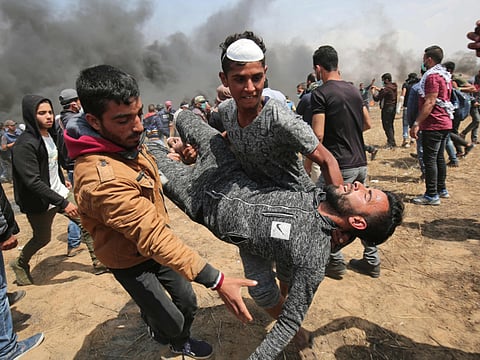Palestinian prisoners will never give up the fight
Jewish colonial practices have converted most Palestinian-Arab communities into large prisons with injustices that have not changed with successive Israeli governments

Every year, Palestinians mark the annual Prisoner’s Day on April 17. Activities and events called for by the Prisoners and ex-Prisoners Affairs Committee and other Palestinian grass roots organisations were held this year, too, to express support to thousands of Palestinians held in Israeli jails. In 1974, the Palestinian National Council set April 17 as a National Day in support of the struggle of Palestinian prisoners.
By the end of last month, the number of Palestinian prisoners in Israeli jails reached 6,500. They face torture, suffering and medical negligence. The prisoners include 63 females — 21 of them are mothers — 11 minors, 350 children and 500 held in the so-called “administrative detention”. The latter never stop protesting their arrest and deprivation of their freedom with no indictment, which is prohibited under international law. Among those prisoners, 534 are sentenced to one or multiple life imprisonments, while 215 were martyred. They were either killed or tortured by special teams or they died as a result of medical negligence. Figures show that more than 1,800 of them are ill in Zionist prisons, including those who fight death. Since 2002, a number of Palestine Legislative Council members as well as Palestinian Cabinet ministers were detained in a bid to undermine the Palestinian political rule. Six representatives were arrested including Khalida Jarrar and Marwan Barghouti, held since 2002 and sentenced to five life terms, while Ahmad Sa’adat is in jail since 2006 under a 30-year prison term.
Israeli forces, that continued to fight regular Arab armies until the year 2000, when they withdrew from Lebanon, have turned to continued “war” of escalated and systematic arrests and killings against a people unarmed, except by its will of resistance. The Israeli soldier, armed with military equipment from head to toe and always ready to attack, is no longer facing another regular soldier. The Israeli army is now fighting the youth, children, women and senior citizens who do not have an army!
All parties to the Palestinian national movement — despite all the circumstances and the momentous hurdles — must formulate a clear strategy to deal with and follow-up the prisoners’ issue. Indeed, the Palestinians realise that no matter how much they seek support from Arab and international human rights organisations or resort to the International Criminal Court, they will not be able to reproduce and create a ‘modern occupation’, not to mention a ‘human occupation!!’ Nevertheless, it is imperative to continue in such a way as to support the issue of the prisoners, to work for their release and to demand international protection for them in accordance with the rules of international public law and international humanitarian law and to pressure Israel to abide by them and by the articles and clauses of the Geneva Conventions relevant to the rights of the Palestinian prisoners in Israeli jails.
It is equally important to activate accountability tools to face perpetrators of violations and crimes against prisoners, consider Israel as a racist state and place it on the international “list of terrorism” and even on a list of disgraceful acts for arresting minors and violating international laws. Parliaments around the world should be asked to boycott the Israeli parliament for formulating racist laws that pose a threat to justice and human values. It is also necessary to re-crystallise the media discourse on the issue of prisoners and martyrs in a way that exposes the double standards of selective justice with which the West deals with the Palestinian cause in general and the issue of martyrs and prisoners — in particular — so that they will not become mere numbers covered by press reports and satellite channels. The proof of this selective justice can be seen in the resounding reactions that accompanied the abduction of Israeli soldiers, years ago, such as Gilad Shalit, Hadar Golden, Shaul Arun and others, when the world made a big hue and cry.
Jewish colonial practices have converted most Palestinian-Arab communities to large prisons, a situation further endangered by Israel’s racist policies towards Palestinians in the West Bank, Gaza Strip and in the 1948 areas. All the injustices and violations have not changed with successive Israeli governments. Unfair laws have been formulated, such as a bill to sentence Palestinian prisoners to death. Yet, Israel, with its apartheid system, has all the elements of ‘demise’ as a colonial and racist project, especially with the global awakening that we have begun to witness for the benefit of the just and legitimate rights of the Palestinian people. It is also necessary to make unrelenting efforts continuously to knock down the occupation walls.
On Prisoners’ Day, we do not lose hope, no matter how long it takes, for “the night will soon end, and the shackles will break up”. We are confident that in this battle, our prisoners will not be the first to cry!
Professor As’ad Abdul Rahman is the chairman of the Palestinian Encyclopaedia.



